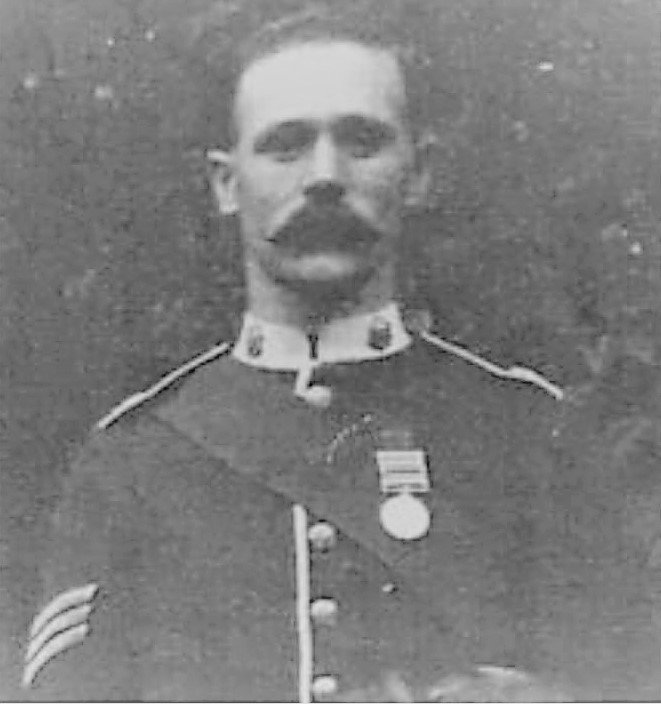CSM
Frederick William Fenne
Information about birth
|
Year of birth: 1882 |
|
Place of birth: Fulham, Middlesex, England, United Kingdom |
General information
|
Last known residence: St. Nicholas Street, Bodmin, Cornwall, England, United Kingdom |
|
Profession: Professional Soldier |
|
Religion: Church of England |
Army information
|
Country: England, United Kingdom |
|
Force: British Expeditionary Force |
|
Rank: Company Serjeant Major |
|
Service number: 5961 |
|
Units: — Duke of Cornwall's Light Infantry, 1st Bn. (Last known unit) |
Information about death
|
Date of death: 04/10/1917 |
|
Place of death: Cameron Covert, Zonnebeke, Belgium |
|
Cause of death: Killed in action (K.I.A.) |
|
Age: 35 |
Memorial
|
Tyne Cot Memorial Panel: 81 A |
Distinctions and medals 3
|
British War Medal Medal |
|
Queen's South Africa Medal Medal |
|
Victory Medal Medal |
Points of interest 3
| #1 | Place of birth | ||
| #2 | Last known residence | ||
| #3 | Place of death (approximate) |
My story
Frederick Fenne was born in 1882, in Middlesex, Fulham. He was a professional soldier with the Duke of Cornwall’s Light Infantry (DCLI), serving in South Africa. He married Henrietta Elizabeth, a Cornish girl.
Frederick served with the 1st Battalion DCLI, during the Battle of Broodseinde on 4 October 1917. During the night of the 3rd/4th of October, the 1st DCLI moved to its assembly positions, south of Polygon Wood, between Jut Farm and Polygon Wood. Cameron Covert, which held numerous machine gun posts, lay in front of Frederick’ Battalion. Beyond Cameron Covert, just in front of the objective line, ran Juniper Trench. The whole area was dotted with pill boxes.
At zero hour, 6 a.m. on the 4th of October, the allied artillery rained down shells. The German artillery quickly responded. When the DCLI advanced they were met by heavy machine-gun fire from Cameron Covert and scattered pill-boxes. The DCLI moved through Cameron Covert, but was unable to continue the attack due to heavy machine-gun and artillery fire.
Frederick, 35, was killed on the 4th of October 1917, leaving behind his wife and two infant sons. Frederick has no known resting place and is commemorated on the Ypres (Menin Gate) Memorial to the missing.
Frederick served with the 1st Battalion DCLI, during the Battle of Broodseinde on 4 October 1917. During the night of the 3rd/4th of October, the 1st DCLI moved to its assembly positions, south of Polygon Wood, between Jut Farm and Polygon Wood. Cameron Covert, which held numerous machine gun posts, lay in front of Frederick’ Battalion. Beyond Cameron Covert, just in front of the objective line, ran Juniper Trench. The whole area was dotted with pill boxes.
At zero hour, 6 a.m. on the 4th of October, the allied artillery rained down shells. The German artillery quickly responded. When the DCLI advanced they were met by heavy machine-gun fire from Cameron Covert and scattered pill-boxes. The DCLI moved through Cameron Covert, but was unable to continue the attack due to heavy machine-gun and artillery fire.
Frederick, 35, was killed on the 4th of October 1917, leaving behind his wife and two infant sons. Frederick has no known resting place and is commemorated on the Ypres (Menin Gate) Memorial to the missing.
Sources 3
|
95 Infantry Brigade: 1 Battalion Duke of Cornwall's Light Infantry (The National Archives, Kew (TNA), British Army war diaries 1914-1922, WO 95/1577/5). https://www.nationalarchives.gov.uk/ Sources used |
|
Census Returns of England and Wales, 1911 (The National Archives, Kew (TNA), RG14). https://www.ancestry.com/ Sources used |
|
Chris McCarthy, Passchendaele: The Day-By-Day Account (Londen: Arms & Armour, 2018), 108-109. Sources used |
More information 3
|
Commonwealth War Graves Commission Database https://www.cwgc.org/find-records/find-war-dead/casualty-details/1631728 |
|
Namenlijst (In Flanders Fields Museum) https://namenlijst.org/publicsearch/#/person/_id=ea1c95d2-73ec-4dd7-8ecb-ba23cc3863b2 |
|
Lives of the First World War (Imperial War Museum) https://livesofthefirstworldwar.iwm.org.uk/lifestory/1219083 |
